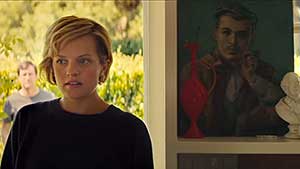Of all forms of art, painting still feels to me like the most romantic and sophisticated. Maybe it's ignorance, or just plain envy, but I still marvel when someone can create a new world simply with a mixing of color and a flick of the wrist. Based on The One I Love, I think director Charlie McDowell feels the same way.
He shouldn't feel that way. McDowell's first feature film is a real doozy, and a filmmaking tutorial on how to leverage a smart script, with limited locations and actors, into something much grander than his tiny canvas should allow.
It's clear, from the evocative poster design to an emotional expression by co-star Mark Duplass, that he's using painting as shorthand for enlightenment throughout the film. Or at least that's how Elizabeth Moss, who plays Duplass's wife, interprets his dabbling in the fine art.
After all, a man who paints must be a sensitive soul, right? Or is that just a projection? And if a woman appreciates the arts, does that threaten a man who lacks those same skills?
The questions in this film go much further than that, of course. Should we work to improve ourselves, or change our expectations of others? At what point are we each still trying to realize our potential versus living in a fantasy? How do we see ourselves, and how do others see us? And what would happen if those two scenarios were somehow drawn together?
I'm only teasing the outline of the film itself, but I feel that's appropriate. You and I both know what the real picture looks like, Jeremy. But there are so many fun and unexpected turns in this dissection of a marriage that it would be a shame to reveal too much ( sounds familiar, I know). Yet what makes The One I Love so appealing is that it's not just a shaded portrait of a relationship, but a tangled and interpretive piece that begs to be examined from multiple angles. A sort of filmic M.C. Escher drawing. Within the first 20 minutes, when the couple goes on a retreat at the behest of their therapist, the film transforms into something that's much higher-concept and richer in theme.
Some people will no doubt take issues with the lack of clarity. McDowell has chosen to paint his world in the abstract. But I would argue that this choice is to the film's credit. The larger metaphor being explored is so strong that it doesn't require more information. I was happy dissecting pure emotion to discover the film's truths.
That's the sign of a great piece of art—painted or otherwise.
Signed,
Christopher







